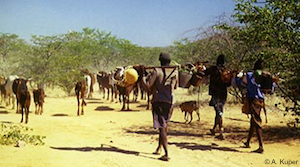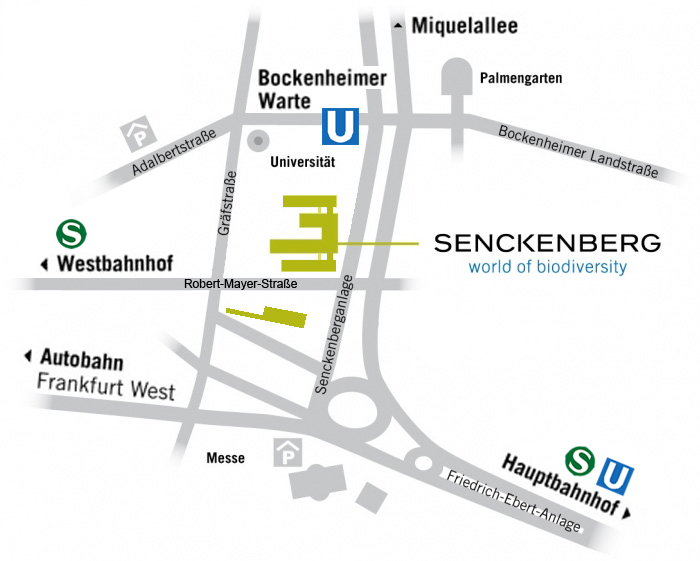|
|
|
|
|
Life Cycle & Everyday Life in Evolutionary Perspective
|
|
|
|
|
|
|
|
||||||||||||||||
|
2nd CALL FOR PAPERS:
"LIFE CYCLE & EVERYDAY LIFE"
|
|
||||||||||||||||
|
|
|||||||||||||||||
|
Location: Senckenberg
Research Institute and Natural History Museum Frankfurt, Human Ethology Film Archive
|
|
||||||||||||||||
|
|
|||||||||||||||||
|
|
|
||||||||||||||||
|
|
|
||||||||||||||||
|
Our evolution is the history of our work. Every day, all its life, an animal is busy with food acquisition, social and reproductive work, and regeneration. In humans, the proportions of each of these tasks in a day's routine, the kind of activities, the respective energetic expenditure, and the cognitive, emotional and physical demands involved vary greatly - over the course of human history, between different groups, between different individuals and in different phases of life. What are the human-specific essential patterns and how do they contribute to the interaction of biocultural evolution? What do we know about day-to-day-life in the history of human-environment interaction, about work, leisure and rest, about working and regeneration times and workloads, about psychic and physical demands and health, about posture and motor skills, mobility or radii of action? How do work rhythms and biological rhythms interact? Which aspects of daily activity in different phases of life of an individual leave permanent traces in the body? What is the explanatory potential offered by new approaches and methods, e. g. in genetics and epigenetics, or the integration of actor-centered concepts into the analysis of evolutionary processes? What are the connections between the characteristics of everyday life, life cycle and ontogeny? Which part does cultural variability play in this context? What are the effects of differences in challenges across specific phases of life such as childhood and youth, or pregnancy? How do cognitive and motor development interact? Which cognitive, emotional, and social processes accompany and affect work and movement? What role do communication, co-operation and division of labor play? And, last but not least, how does our evolutionary make-up make itself felt under contemporary conditions of everyday life and work? We hope for a broad range of
subjects and insights into current research from various disciplines!
We look forward to your contributions! Extended submission deadline: August 15, 2018 |
|
||||||||||||||||
|
|
|
||||||||||||||||
|
|
|
|
||||||||||||||||
|
"Modern models of the past and dramatic change: On Anthropology und Medicine of the Eipo" Wulf Schiefenhoevel is Head of the Human Ethology Group at the MPIO, Starnberg-Seewiesen, and Professor of Human Ethology at the Institute of Psychology, University of Innsbruck. First Fieldwork in New Guinea 1965/66, since then ongoing research projects, mainly with Eipo in the Highlands of Papua province, Indonesia, on medical and anthropological issues; since several years in collaboration with Marian Vanhaeren (CNRS and University of Bordeaux) on ethnoarchaeological issues. Together with Martin Bruene editor of the "Oxford University Press Handbook of Evolutionary Medicine" (in press). |
|
||||||||||||||||
|
"The Urban Challenge - Health indicators of environmental stress and adaptation throughout humankind" Dr. Ursula Wittwer-Backofen is a Professor in Biological Anthropology at the Medical Faculty at the University of Freiburg, Germany. She studied Biology, Physical Anthropology, Chemistry and near Eastern Archaeology at the University of Berlin (Freie Universität), Mainz and Heidelberg.
Ursula Wittwer-Backofen's Homepage at the University of Freiburg |
|
||||||||||||||||
|
|
|
|
||||||||||||||||
|
|
|
||||||||||||||||
|
Possible topics are basic methodological questions or problems arising from specific methods in research, such as: characterization and demarcation of units of investigation; the significance of cross-cultural research and problems related to it; the reception of methodological deficiencies and the scope of their impact; research artefacts due to ethnocentrism and gender bias; authenticity in field work and laboratory research; sample representativeness; problems emerging from online research and internet analyses; research obstacles such as intercultural misinterpretation, purposeful research or hidden agendas, ethical considerations, and alike. We see this session as a colloquium-like forum for open discussion including both the presentation of topics and the opportunity to discuss methodological issues from your own research. Key subjects of debate will arise from the submitted contributions. Presentations should be in PechaKucha format (max. 20 slides, 20 sec. each), so that there will be enough time for discussion. We look forward to your contributions! Extended submission deadline: August 15, 2018 |
|
||||||||||||||||
|
|
|
|
||||||||||||||||
|
REGISTRATION |
|
||||||||||||||||
|
The conference will be held in German and English. Your presentations and posters can thus be in either English or German. If you wish to give your talk in German, your presentation slides may be in English, and vice versa. Even if you intend to give your talk in German, it is possible to submit your contribution in both English and German, so that internet search engines can find and display your submission. Last submission deadline: August 15, 2018 |
|
||||||||||||||||
|
|
|
||||||||||||||||
|
|
|
||||||||||||||||
|
|
|
||||||||||||||||
|
|
|
|
||||||||||||||||
|
|
|
||||||||||||||||
|
|
|
||||||||||||||||
|
Conference room:
S-Bahn (suburban train) lines S3, S4, S5 and S6 - "Westbahnhof"
station (12 min. walk) From the central railway station "Hauptbahnhof":
Taxi call +49 - (0) 69 - 733 030 or +49 - (0) 69 - 3650 65000 or +49 - (0) 69 - 4800 8928
Arriving from the South or East:
Arriving from the North or West:
Parking
Guide dogs are allowed in the museum. |
|
||||||||||||||||
|
|
|
|
||||||||||||||||
|
|
|
||||||||||||||||
|
NB: The city of Frankfurt charges a tourist tax for overnight guests on private trips (€ 2.00 per day). The tax is not charged for business trips, so please state your business address and reason of stay when booking the hotel.
Art-Hotel Robert
Mayer
Fleming's Hotel Frankfurt - Hamburger Allee
Hotel Corona Garni GmbH
Novum Hotel Imperial Frankfurt
aCasa Bed&Breakfast Gästehaus
Youth hostel "Haus der Jugend" (DJH)
Frankfurt Hostel
|
|
MVE-Jahrestagung 2018: 2. Call for papers: 18. Jahrestagung der interdisziplinären
MVE-Liste "Menschliches Verhalten in Evolutionärer Perspektive" - english


